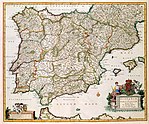
Back حرب غرناطة Arabic Guerra de Granada AST قرانادا ساواشی AZB Гранадская вайна Byelorussian Гранадска война Bulgarian গ্রানাডা যুদ্ধ Bengali/Bangla Brezel Granada Breton Guerra de Granada Catalan Eroberung des Königreiches Granada German Πόλεμος της Γρανάδας Greek
| Granada War | |||||||
|---|---|---|---|---|---|---|---|
| Part of the Reconquista | |||||||
 The Surrender of Granada by F. Pradilla: Muhammad XII (Boabdil) surrenders to Ferdinand and Isabella. | |||||||
| |||||||
| Belligerents | |||||||
|
|
| ||||||
| Commanders and leaders | |||||||
|
|
| ||||||
| Casualties and losses | |||||||
| Unknown | 100,000 dead or enslaved (including civilians)[1] | ||||||
| History of Spain |
|---|
 |
| Timeline |
The Granada War (Spanish: Guerra de Granada) was a series of military campaigns between 1482 and 1492 during the reign of the Catholic Monarchs, Isabella I of Castile and Ferdinand II of Aragon, against the Nasrid dynasty's Emirate of Granada. It ended with the defeat of Granada and its annexation by Castile, ending the last remnant of Islamic rule on the Iberian peninsula.
The ten-year war was not a continuous effort but a series of seasonal campaigns launched in spring and broken off in winter. The Granadans were crippled by internal conflict and civil war, while the Christians were generally unified. The Granadans were also bled economically by the tribute (Old Spanish: paria) they had to pay Castile to avoid being attacked and conquered. The war saw the effective use of artillery by the Christians to rapidly conquer towns that would otherwise have required long sieges. On January 2, 1492, Muhammad XII of Granada (King Boabdil) surrendered the Emirate of Granada, the city of Granada, and the Alhambra palace to the Castilian forces.
The war was a joint project between Isabella's Crown of Castile and Ferdinand's Crown of Aragon. The bulk of the troops and funds for the war came from Castile, and Granada was annexed into Castile's territory. The Crown of Aragon was less important: apart from the presence of King Ferdinand himself, Aragon provided naval collaboration, guns, and some financial loans. Aristocrats were offered the allure of new lands, while Ferdinand and Isabella centralized and consolidated their power.
The aftermath of war brought to an end coexistence between religions in the Iberian peninsula: Jews were forced to convert to Christianity or be exiled in 1492, and by 1501, all of Granada's Muslims were obliged to convert to Christianity, become slaves, or be exiled; by 1526 this prohibition spread to the rest of Spain. "New Christians" (conversos) came to be accused of crypto-Islam and crypto-Judaism.[2] Spain would go on to model its national aspirations as the guardian of Christianity and Catholicism. The fall of the Alhambra is still celebrated every year by the City Council of Granada, and the Granada War is considered in traditional Spanish historiography as the final war of the Reconquista.
- ^ Kamen, Henry. "Spain 1469–1714 A Society of Conflict." Third edition. pp. 37–38
- ^ Harvey, L. P. (2005). Muslims in Spain, 1500 to 1614. University Of Chicago Press. ISBN 978-0-226-31963-6.
© MMXXIII Rich X Search. We shall prevail. All rights reserved. Rich X Search